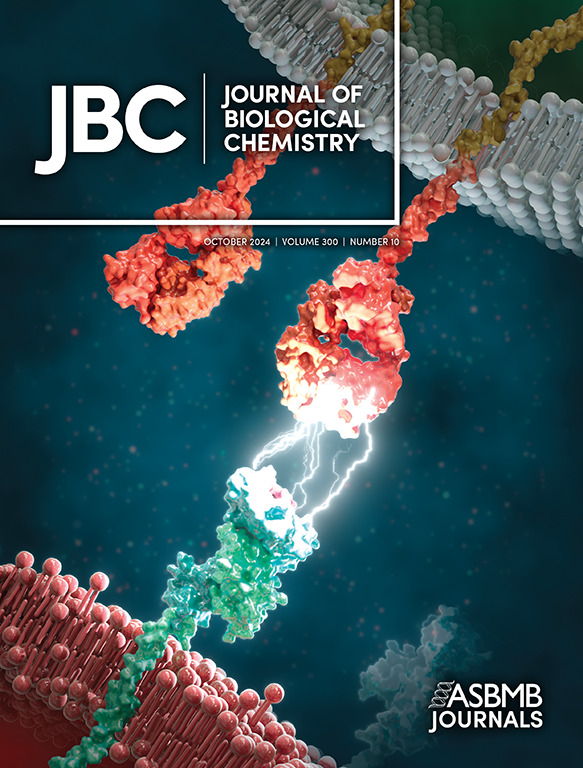USP52 inhibits cell ferroptosis via Hippo/YAP pathway and blocks immunotherapy in colorectal cancer.
IF 4
2区 生物学
Q2 BIOCHEMISTRY & MOLECULAR BIOLOGY
引用次数: 0
Abstract
Colorectal cancer (CRC) is one of the most prevalent malignancies in humans. Understanding its molecular mechanisms to guide clinical management is crucial. Ferroptosis represents a novel form of regulated cell death that is characterized by highly iron-dependent lipid peroxidation. Despite growing interest, the roles and vulnerabilities determining ferroptosis sensitivity in CRC remain unclear. In this study, we identified Ubiquitin Specific Peptidase 52 (USP52) as a specific deubiquitinating enzyme of yes-associated protein (YAP) in CRC, which could stabilize YAP by removing the K11-linked ubiquitin chains. USP52 knockdown decreased the expression of YAP protein and its target gene (CTGF, CYR61). Through a series of comprehensive in vivo and in vitro experiments, we proved that USP52 promoted CRC cells proliferation, migration, and invasion and attenuated the sensitivity of CRC cells to ferroptosis. Notably, USP52 inhibition retarded tumor growth and enhanced CD8+ T cell infiltration, which potentiated tumor response to anti-PD-L1 immunotherapy in vivo. In general, our research uncovered that USP52 suppressed ferroptosis through the Hippo/YAP signaling and highlighted targeting USP52 as a potential therapeutic strategy to boost ferroptosis for enhancing cancer immunotherapy.USP52通过Hippo/YAP途径抑制细胞铁下垂,阻断结直肠癌的免疫治疗。
结直肠癌(CRC)是人类最常见的恶性肿瘤之一。了解其分子机制对指导临床治疗至关重要。铁下垂是一种新型的受调节细胞死亡,其特点是高度依赖铁的脂质过氧化。尽管越来越多的兴趣,在CRC中决定铁下垂敏感性的作用和脆弱性仍然不清楚。在这项研究中,我们发现泛素特异性肽酶52 (Ubiquitin Specific Peptidase 52, USP52)是CRC中yes-associated protein (YAP)的特异性去泛素化酶,它可以通过去除k11连接的泛素链来稳定YAP。USP52敲低可降低YAP蛋白及其靶基因(CTGF、CYR61)的表达。通过一系列全面的体内和体外实验,我们证明了USP52促进CRC细胞的增殖、迁移和侵袭,并减弱CRC细胞对铁凋亡的敏感性。值得注意的是,USP52抑制延缓了肿瘤生长,增强了CD8+ T细胞浸润,从而增强了肿瘤对体内抗pd - l1免疫治疗的反应。总的来说,我们的研究发现USP52通过Hippo/YAP信号抑制铁下垂,并强调靶向USP52作为一种潜在的治疗策略来促进铁下垂,从而增强癌症免疫治疗。
本文章由计算机程序翻译,如有差异,请以英文原文为准。
求助全文
约1分钟内获得全文
求助全文
来源期刊

Journal of Biological Chemistry
Biochemistry, Genetics and Molecular Biology-Biochemistry
自引率
4.20%
发文量
1233
期刊介绍:
The Journal of Biological Chemistry welcomes high-quality science that seeks to elucidate the molecular and cellular basis of biological processes. Papers published in JBC can therefore fall under the umbrellas of not only biological chemistry, chemical biology, or biochemistry, but also allied disciplines such as biophysics, systems biology, RNA biology, immunology, microbiology, neurobiology, epigenetics, computational biology, ’omics, and many more. The outcome of our focus on papers that contribute novel and important mechanistic insights, rather than on a particular topic area, is that JBC is truly a melting pot for scientists across disciplines. In addition, JBC welcomes papers that describe methods that will help scientists push their biochemical inquiries forward and resources that will be of use to the research community.
 求助内容:
求助内容: 应助结果提醒方式:
应助结果提醒方式:


